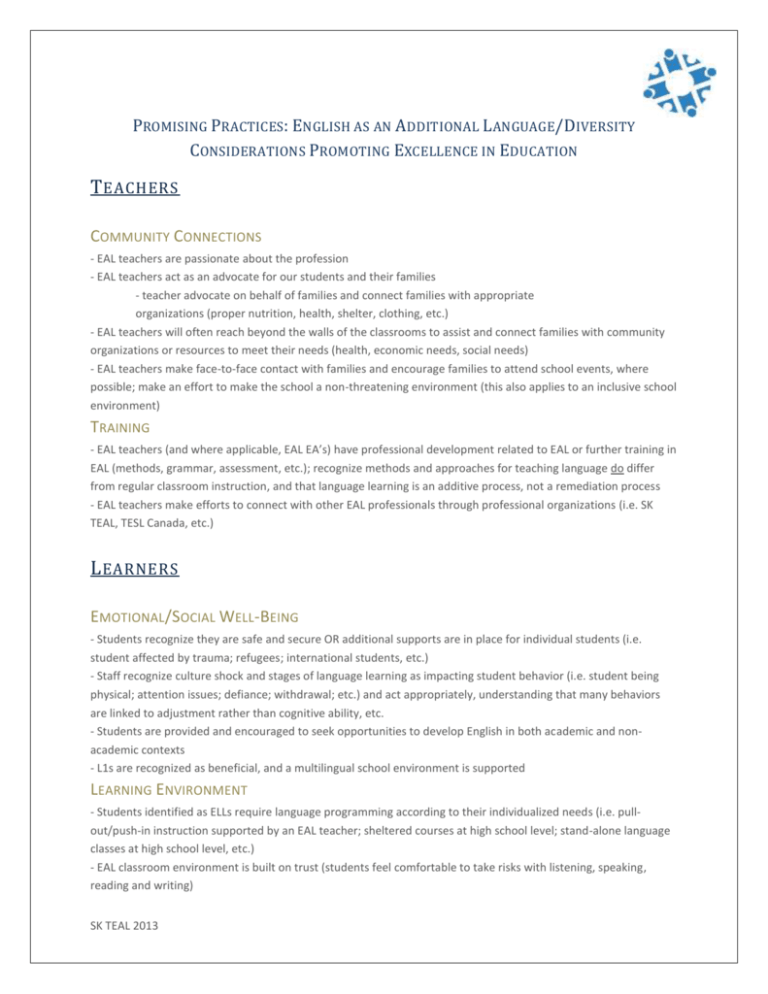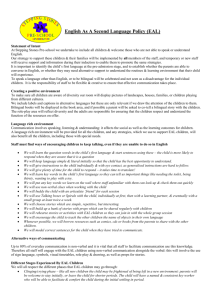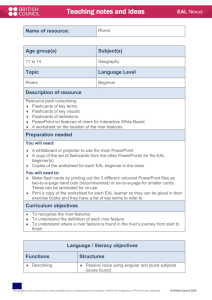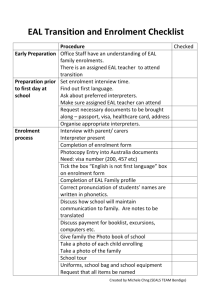Teachers - Saskatchewan Teachers of English as an Additional
advertisement

PROMISING PRACTICES: ENGLISH AS AN ADDITIONAL LANGUAGE/DIVERSITY CONSIDERATIONS PROMOTING EXCELLENCE IN EDUCATION T EACHERS COMMUNITY CONNECTIONS - EAL teachers are passionate about the profession - EAL teachers act as an advocate for our students and their families - teacher advocate on behalf of families and connect families with appropriate organizations (proper nutrition, health, shelter, clothing, etc.) - EAL teachers will often reach beyond the walls of the classrooms to assist and connect families with community organizations or resources to meet their needs (health, economic needs, social needs) - EAL teachers make face-to-face contact with families and encourage families to attend school events, where possible; make an effort to make the school a non-threatening environment (this also applies to an inclusive school environment) TRAINING - EAL teachers (and where applicable, EAL EA’s) have professional development related to EAL or further training in EAL (methods, grammar, assessment, etc.); recognize methods and approaches for teaching language do differ from regular classroom instruction, and that language learning is an additive process, not a remediation process - EAL teachers make efforts to connect with other EAL professionals through professional organizations (i.e. SK TEAL, TESL Canada, etc.) L EARNERS EMOTIONAL/SOCIAL WELL-BEING - Students recognize they are safe and secure OR additional supports are in place for individual students (i.e. student affected by trauma; refugees; international students, etc.) - Staff recognize culture shock and stages of language learning as impacting student behavior (i.e. student being physical; attention issues; defiance; withdrawal; etc.) and act appropriately, understanding that many behaviors are linked to adjustment rather than cognitive ability, etc. - Students are provided and encouraged to seek opportunities to develop English in both academic and nonacademic contexts - L1s are recognized as beneficial, and a multilingual school environment is supported LEARNING ENVIRONMENT - Students identified as ELLs require language programming according to their individualized needs (i.e. pullout/push-in instruction supported by an EAL teacher; sheltered courses at high school level; stand-alone language classes at high school level, etc.) - EAL classroom environment is built on trust (students feel comfortable to take risks with listening, speaking, reading and writing) SK TEAL 2013 S CHOOL C OMMUNITY STUDENT PLACEMENT - Elementary English language learners are placed in age-appropriate classrooms; high school ELLs are enrolled in a program with consideration for age, language level and academic ability INCLUSIVE & SUPPORTIVE ENVIRONMENTS - Staff recognizes that teaching ELLs is the responsibility of the whole school - Staff recognizes that language learning is a process (developmental), not a procedure (i.e. Jim Cummins’ theory of language learning [BICS & CALP]) and that language learning requires time - A team approach is taken to providing support for ELLs (administrators, classroom teachers, educational assistants, resource teachers, counselors, SSWIS, etc.) - EAL students and teachers have appropriate and consistent learning spaces - Divisions have (and school follows) developed protocol regarding the use of standardized assessments and cognitive assessments with ELLs - Staff is aware that many standardized tests are made for native language speakers and have cultural bias - Staff is aware that cognitive tests are language-heavy and results may be skewed based on a student’s English language proficiency level. - If further discussion is needed regarding behavior/cognitive needs, a process of collecting evidence and talking with families is required before referral. STAFF SUPPORT - Staff collaboration with EAL teachers is supported by administration (i.e. scheduling/coordinating preparation times; for meetings (planning; co-teaching, etc.); EAL teacher included in TEAMS meetings, etc.) - EAL teacher coordinates and/or provides PD for school-based staff during staff meetings as much as possible SK TEAL 2013






